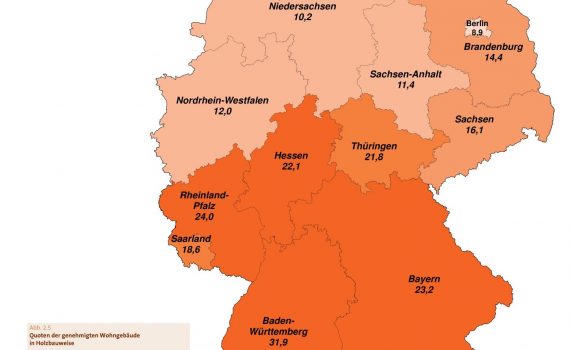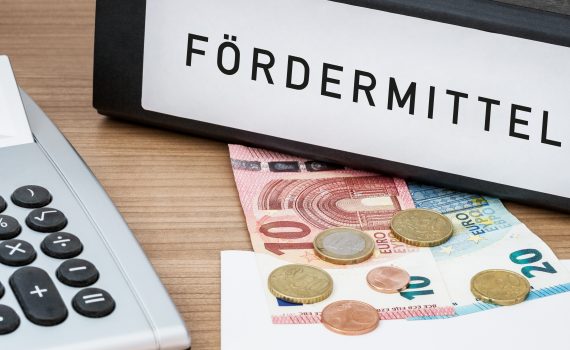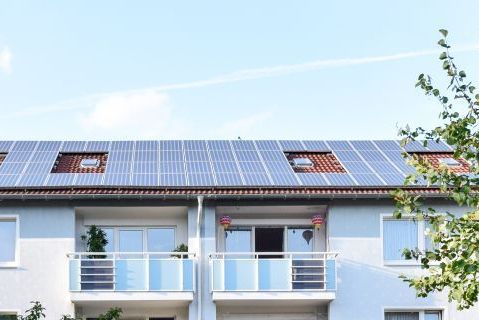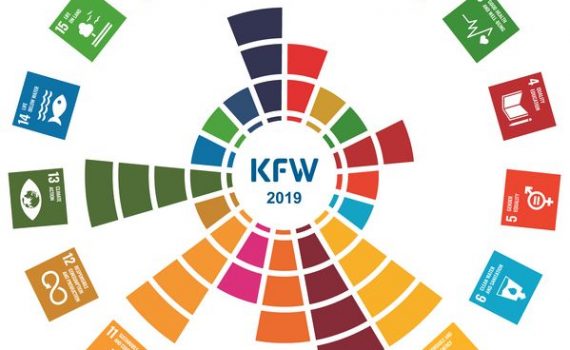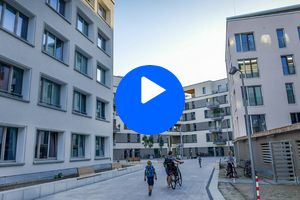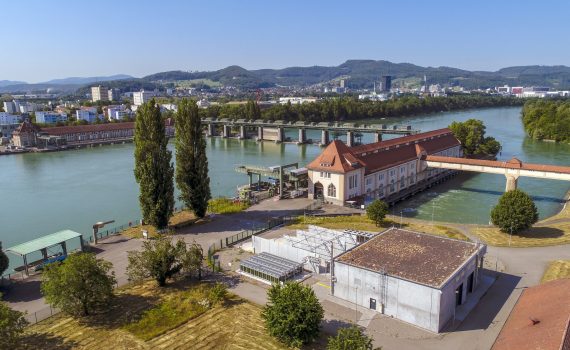Kategorie für Blog: Climate protection
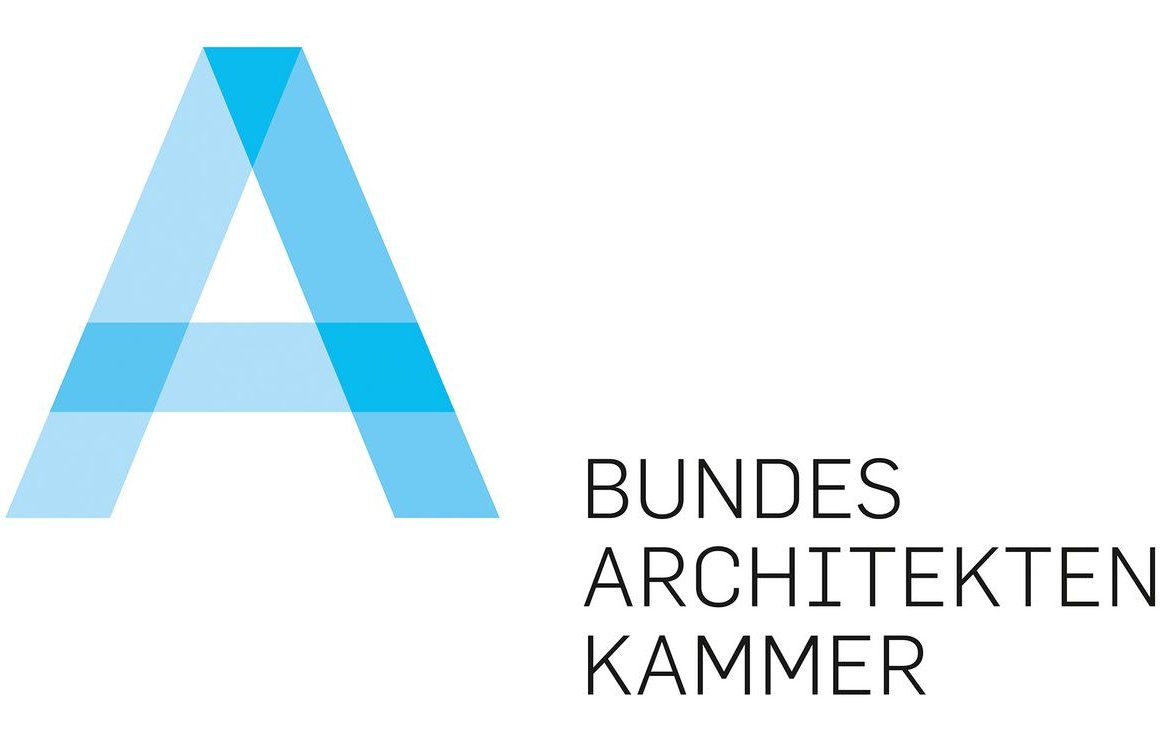 The Federal Chamber of Architects (BAK) and the Federal Foundation of Baukultur presented their proposal for a "Baukultur Innovation Programme" to politicians in Berlin today on behalf of the planning and construction industry.
Anne Katrin Bohle, State Secretary at the Federal Ministry of the Interior, Building and Community, accepted the four-point plan. In it, the authors suggest measures to overcome the coronavirus crisis that will have a lasting economic and social impact.
The Federal Chamber of Architects (BAK) and the Federal Foundation of Baukultur presented their proposal for a "Baukultur Innovation Programme" to politicians in Berlin today on behalf of the planning and construction industry.
Anne Katrin Bohle, State Secretary at the Federal Ministry of the Interior, Building and Community, accepted the four-point plan. In it, the authors suggest measures to overcome the coronavirus crisis that will have a lasting economic and social impact.
 Environment Minister Franz Untersteller reacted with relief to the agreement reached yesterday by the coalition on the amendment of the Climate Protection Act. The law is to be passed by the state parliament before the summer break and will then replace the previous climate protection law from 2013.
Environment Minister Franz Untersteller reacted with relief to the agreement reached yesterday by the coalition on the amendment of the Climate Protection Act. The law is to be passed by the state parliament before the summer break and will then replace the previous climate protection law from 2013.
 The discussion about climate change and the growing demand for living space have increasingly brought timber construction into the focus of planners, architects and developers over the past year. After all, sustainable timber construction can make a significant contribution to climate protection and the creation of living space. The increased interest in timber construction is also reflected in the industry figures: the turnover of companies grew by 7 percent in 2019 compared to the previous year, the number of employees increased from around 68,000 to around 70,000 and the timber construction rate continued to grow in both residential (new construction) and non-residential (new construction) construction.
The discussion about climate change and the growing demand for living space have increasingly brought timber construction into the focus of planners, architects and developers over the past year. After all, sustainable timber construction can make a significant contribution to climate protection and the creation of living space. The increased interest in timber construction is also reflected in the industry figures: the turnover of companies grew by 7 percent in 2019 compared to the previous year, the number of employees increased from around 68,000 to around 70,000 and the timber construction rate continued to grow in both residential (new construction) and non-residential (new construction) construction.
 Berlin/Cologne. Climate protection and adaptation to the consequences of climate change will become increasingly important for cities. This is one of the findings of the survey of (Lord) Mayors of large German cities* conducted by the German Institute of Urban Affairs in January and February 2020. Almost two-thirds of the respondents named climate protection as an important municipal issue for the future. This means that the number of mayors who attribute an increase in importance to this field of municipal policy action has more than tripled compared to the previous year. Future surveys will show how strongly this result was influenced by the protests of the 'Fridays for Future' movement.
Berlin/Cologne. Climate protection and adaptation to the consequences of climate change will become increasingly important for cities. This is one of the findings of the survey of (Lord) Mayors of large German cities* conducted by the German Institute of Urban Affairs in January and February 2020. Almost two-thirds of the respondents named climate protection as an important municipal issue for the future. This means that the number of mayors who attribute an increase in importance to this field of municipal policy action has more than tripled compared to the previous year. Future surveys will show how strongly this result was influenced by the protests of the 'Fridays for Future' movement.
 Brussels/Freiburg, 5 May 2020 - An alliance "Solar Europe Now", officially launched on 5 May, is calling for solar energy to be recognised as a key technology for the objectives of the European Green Deal. The new alliance, which currently includes more than 90 players from the entire value chain of the European solar industry, is concerned that the photovoltaic sector is not being given enough consideration in the current presentation of the Green Deal.
Brussels/Freiburg, 5 May 2020 - An alliance "Solar Europe Now", officially launched on 5 May, is calling for solar energy to be recognised as a key technology for the objectives of the European Green Deal. The new alliance, which currently includes more than 90 players from the entire value chain of the European solar industry, is concerned that the photovoltaic sector is not being given enough consideration in the current presentation of the Green Deal.
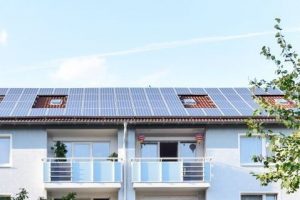 In Vienna, as a rule, no residential building may be erected without a solar system in the future. This is stipulated in an amendment to the building code, which is currently being evaluated, the red-green city government informed on Monday. Currently, such a photovoltaic obligation applies only to industrial buildings.
In Vienna, as a rule, no residential building may be erected without a solar system in the future. This is stipulated in an amendment to the building code, which is currently being evaluated, the red-green city government informed on Monday. Currently, such a photovoltaic obligation applies only to industrial buildings.
 In research, neighbourhoods have been recognised as an important level of action for climate protection. For this reason, the BMBF, BMU and the Federal Ministry of Building and Transport have funded several research projects on sustainable neighbourhoods, which are now being worked on. The consensus of the research projects presented and the funding bodies is that it is important to research neighbourhood concepts for a climate-friendly heat and electricity supply as well as an environmentally friendly mobility offer in an economical way" and "to link the individual elements in the sense of a functioning sector coupling in a meaningful way."
The focus articles in the "Ecological Economy 3/2019" issue highlight the potential of the neighbourhood approach for the implementation of climate protection measures, but also present best practice examples and discuss feasibility in practice.
In research, neighbourhoods have been recognised as an important level of action for climate protection. For this reason, the BMBF, BMU and the Federal Ministry of Building and Transport have funded several research projects on sustainable neighbourhoods, which are now being worked on. The consensus of the research projects presented and the funding bodies is that it is important to research neighbourhood concepts for a climate-friendly heat and electricity supply as well as an environmentally friendly mobility offer in an economical way" and "to link the individual elements in the sense of a functioning sector coupling in a meaningful way."
The focus articles in the "Ecological Economy 3/2019" issue highlight the potential of the neighbourhood approach for the implementation of climate protection measures, but also present best practice examples and discuss feasibility in practice.
3:00 min. Published: 12.03.2020
The non-profit association GermanZero has taken the initiative and put together a comprehensive package of measures - now it is to be implemented. The initiative is seeking support with the video.
Joining us are:
Rike Schmid, Rezo, Jan Josef Liefers, Christoph Kramer, Carolin Kebekus, Charly Hübner, Jan Delay, Markus Kavka, Katrin Ingendoh, Andreas Rettig, Nik Xhelilaj, Rewinside, Mark Zwinz, Anneke Kim Sarnau, Emma Bading, Volker Bruch, Lars Jessen, Peter Jordan, Karoline Eichhorn, Wanja Mues, Jan Plewka, Marlis Heppeler, Steffen Weinhold, Katharina Wackernagel, Christine Urspruch, Raul Krauthausen, Rocko Schamoni, Mojib Latif, Joko Winterscheidt, Stephan Schad, André Schürrle, Moritz Vierboom, Friederike Kempter, Matthias Willenbacher, Axel Prahl, Maria Ketikidou, Mirella Precek, Jan Georg Schütte, Bjarne Mädel, Pheline Roggan, Andreas Altenburg, Lisa Maria Potthoff, Désirée von Delft, Peter Smits, Gustav Peter Wöhler, Ruth Toma, Maren Eggert, Benjamin Sadler, Fettes Brot, Jonas Nay, Stephan Kampwirth, Miriam Stein, Lea van Acken
- Over EUR 28 billion for "climate protection measures": KfW is one of the most important supporters of the Paris climate goals
- Promotional bank is a global pioneer with its standardised SDG mapping
- Strong international interest in KfW SDG mapping
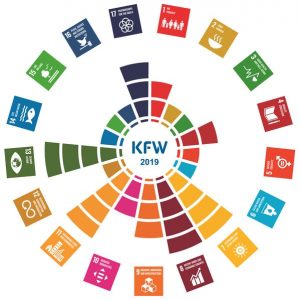 KfW is today publishing the results of the SDG mapping of new commitments throughout the Group in 2019. In order to clarify the individual contribution made by KfW's new commitments to achieving the UN Sustainable Development Goals, KfW has developed a standardised procedure: 1,500 indicators are used each year to determine to which SDGs KfW's new commitments can be assigned. This makes the contribution transparent at both group and business sector level.
KfW is today publishing the results of the SDG mapping of new commitments throughout the Group in 2019. In order to clarify the individual contribution made by KfW's new commitments to achieving the UN Sustainable Development Goals, KfW has developed a standardised procedure: 1,500 indicators are used each year to determine to which SDGs KfW's new commitments can be assigned. This makes the contribution transparent at both group and business sector level.A further 700,000 euros will be available for #moinzukunft cargo bikes from 1 April. Up to 2,000 euros in subsidies are possible for the purchase of a new e-load bike and 500 euros for normal load bikes.
From 2022, all new public buildings must be made of at least 50 per cent wood or other sustainable building materials. For buildings with more than eight storeys, the supporting structure must even be made entirely of wood. It was also decided that 90 ecological neighbourhoods and 100 urban farms will be built in Paris.
With retroactive effect from 1 January 2020, the timber construction subsidy in Hamburg has now officially been increased to EUR 0.80 per kilogramme of timber product as part of the various subsidised housing construction programmes. As a prerequisite for the subsidy,...
Newly built districts with space-efficient mobility offers
A new sustainable urban district is being built on the west side of the Merwedekanal in a central location not far from Utrecht Central Station. The plan is to create a mixed-use district with 6,000 to 9,000 homes for approximately 12,000 residents. The area will become a showcase for healthy and sustainable living with innovative concepts for recycling, energy production, climate adaptation and mobility solutions. Planned completion: by 2024
Since 1 January 2020, all new buildings and general renovations of the BIG Group have been subject to the Group-wide mandatory minimum sustainable standard. The BIG minimum standard goes beyond the legal requirements and ensures that all projects of BIG and its subsidiary ARE achieve the klimaaktiv SILVER standard in any case. The sustainable minimum standard of the Bundesimmobiliengesellschaft (BIG) is a catalogue of criteria that must already be taken into account in the planning process for buildings. This makes the implementation of 43 measures of the BIG Holistic Building Programme (HBP)* and the achievement of at least 750 klimaaktiv points mandatory for all new construction and general refurbishment projects for which a planning invention procedure will be carried out from 2020. By implementing the minimum standard, CO2 emission values are significantly reduced, climate-damaging building materials are avoided and the phase-out of fossil fuels is accelerated.
Climate protection has long been one of the most urgent topics for the housing industry. In order to achieve a climate-neutral building stock by 2050, the 24 founding companies of the Wohnen.2050 initiative met in Berlin on 28 January 2020 to found the association. The nationwide association was initiated by the Nassauische Heimstätte | Wohnstadt group of companies.
 "Don't just talk about climate change, act" - under this motto, the Nassauische Heimstätte | Wohnstadt Group invited founding partners from all over Germany to found the Initiative Wohnen.2050 (IW2050) association. The overarching objective is a climate policy alliance, which, in addition to strategic cooperation and a technical and content-related comparison, primarily focuses on economic and financial concerns to achieve the targets.
"Don't just talk about climate change, act" - under this motto, the Nassauische Heimstätte | Wohnstadt Group invited founding partners from all over Germany to found the Initiative Wohnen.2050 (IW2050) association. The overarching objective is a climate policy alliance, which, in addition to strategic cooperation and a technical and content-related comparison, primarily focuses on economic and financial concerns to achieve the targets.
 Recently, the Austrian state of Vorarlberg published the subsidy guidelines for 2020 and 2021 for residential renovation and new construction in the private and public sectors. The climate-friendly procurement of wood and wood products from the region is anchored in these guidelines. The origin of the wood must be proven by means of the "Holz von Hier" label recently introduced in Austria or comparable certificates.
Recently, the Austrian state of Vorarlberg published the subsidy guidelines for 2020 and 2021 for residential renovation and new construction in the private and public sectors. The climate-friendly procurement of wood and wood products from the region is anchored in these guidelines. The origin of the wood must be proven by means of the "Holz von Hier" label recently introduced in Austria or comparable certificates.
A research project conducted by natureplus in conjunction with IFEU compares insulation materials with regard to their environmental impact throughout their entire life cycle, including recovery and recycling.

 Which insulation material is the best? This question is extremely popular in the construction industry and can ultimately only be answered in the context of the respective construction. In particular, there has so far been a lack of a holistic overview that enables builders and planners to identify the strengths and weaknesses of the various insulation material alternatives in terms of their life cycle assessment, without having to disregard subsequent disposal.
Which insulation material is the best? This question is extremely popular in the construction industry and can ultimately only be answered in the context of the respective construction. In particular, there has so far been a lack of a holistic overview that enables builders and planners to identify the strengths and weaknesses of the various insulation material alternatives in terms of their life cycle assessment, without having to disregard subsequent disposal.
Thuringia is making six million euros available this year for investments in municipal climate protection. The funding comes from the state's "Klima Invest" programme, which has already provided more than 15.5 million euros in investments in municipalities since the beginning of 2018, as the Ministry of the Environment announced in Erfurt on Thursday. 312 applications for funding have been approved.
 27.01.2020 A material revolution that replaces cement and steel with wood in urban construction can have double benefits for climate stabilization. This is now shown in a study by an international team of scientists. First, it can avoid greenhouse gas emissions from cement and steel production. Secondly, it can turn buildings into carbon sinks, since in the construction timber the CO2 is stored. Although the required amount of wood is theoretically available, such an expansion would require very careful sustainable forest management, the authors emphasize.
27.01.2020 A material revolution that replaces cement and steel with wood in urban construction can have double benefits for climate stabilization. This is now shown in a study by an international team of scientists. First, it can avoid greenhouse gas emissions from cement and steel production. Secondly, it can turn buildings into carbon sinks, since in the construction timber the CO2 is stored. Although the required amount of wood is theoretically available, such an expansion would require very careful sustainable forest management, the authors emphasize.
This week, the German cabinet plans to adopt the draft bill on the coal phase-out law. However, the roadmap for the shutdown of coal-fired power plants that is to be voted on deviates in several places from the coal compromise reached last year. The Solar Cluster Baden-Württemberg points this out and demands considerable improvements. According to the draft law, carbon dioxide emissions will be reduced significantly less than agreed in the first ten years: By 2030, only five gigawatts instead of 20 gigawatts of power are to be switched off. In addition, the number of CO2 allowances will not fall to the same extent as coal-fired power generation.
150 concrete proposals are contained in a catalogue that the city of Bonn has drawn up in recent months following the declaration of the climate emergency. Many of the measures can be implemented directly by the administration, while others require a political decision. At a press conference on Wednesday, 22 January 2020, Lord Mayor Ashok Sridharan and City Planning Officer Helmut Wiesner presented the catalogue of measures. On 4 July 2019, Bonn City Council decided to support a resolution to declare a climate emergency. Bonn has thus joined other municipalities and reaffirmed that climate protection must be a top priority in municipal action. The administration has therefore drawn up a catalogue of measures over the past few months with the involvement of all departments.
 21.01.2020 Everyone is talking about sustainability - including the construction industry. A prize that the Federal Ministry for the Environment, Nature Conservation and Nuclear Safety (BMU) and the Federal Environment Agency (UBA) have been offering since today provides the appropriate topic for discussion: With the new "Federal Award for Environment and Building", which will be awarded for the first time in 2020, the initiators want to distinguish projects with exemplary character in terms of sustainability - not only in the classic areas of existing buildings and new buildings, but also in five other categories. All players in the building sector can apply. The deadline for entries is 15 April 2020.
21.01.2020 Everyone is talking about sustainability - including the construction industry. A prize that the Federal Ministry for the Environment, Nature Conservation and Nuclear Safety (BMU) and the Federal Environment Agency (UBA) have been offering since today provides the appropriate topic for discussion: With the new "Federal Award for Environment and Building", which will be awarded for the first time in 2020, the initiators want to distinguish projects with exemplary character in terms of sustainability - not only in the classic areas of existing buildings and new buildings, but also in five other categories. All players in the building sector can apply. The deadline for entries is 15 April 2020.
 Climate protection and socially just construction and housing must be considered together - Legal regulations in the rental housing sector and state subsidy practice undermine climate goals in the building sector - Deutsche Umwelthilfe and Deutscher Mieterbund present 10-point immediate programme for socially acceptable design of energy modernisation in existing and new buildings - KfW subsidy practice must be subjected to a reality check - Social provisions must be supplemented by climate policy requirements
Climate protection and socially just construction and housing must be considered together - Legal regulations in the rental housing sector and state subsidy practice undermine climate goals in the building sector - Deutsche Umwelthilfe and Deutscher Mieterbund present 10-point immediate programme for socially acceptable design of energy modernisation in existing and new buildings - KfW subsidy practice must be subjected to a reality check - Social provisions must be supplemented by climate policy requirements
 The share of renewable energies in electricity consumption rises to almost 43 percent. The climate protection successes in the electricity sector are diminished by rising greenhouse gas emissions in buildings and transport. In parallel, public interest in climate protection is rising: since May 2019, it has consistently been the most pressing political issue in the eyes of the population. This is shown by Agora Energiewende's 2019 annual evaluation.
The share of renewable energies in electricity consumption rises to almost 43 percent. The climate protection successes in the electricity sector are diminished by rising greenhouse gas emissions in buildings and transport. In parallel, public interest in climate protection is rising: since May 2019, it has consistently been the most pressing political issue in the eyes of the population. This is shown by Agora Energiewende's 2019 annual evaluation.
 One of the Herculean tasks to achieve the climate targets is to radically reduce CO2 emissions from the heat supply. A group of researchers led by the Institute for Ecological Economy Research (IÖW) shows how cities can turn away from coal, oil and gas in a socially acceptable way. The project "Urban Heat Turnaround" investigated possible contributions from renewable energies and local heat sources in Berlin's urban neighbourhoods. "Waste heat from businesses, heat from waste water or geothermal energy have hardly been used so far.
One of the Herculean tasks to achieve the climate targets is to radically reduce CO2 emissions from the heat supply. A group of researchers led by the Institute for Ecological Economy Research (IÖW) shows how cities can turn away from coal, oil and gas in a socially acceptable way. The project "Urban Heat Turnaround" investigated possible contributions from renewable energies and local heat sources in Berlin's urban neighbourhoods. "Waste heat from businesses, heat from waste water or geothermal energy have hardly been used so far.
 ROBIN WOOD has scrutinized the green electricity offers of 1,200 providers and publishes the results today in the "ROBIN WOOD Eco-Electricity Report 2020.". The environmental organization rates eight offers as recommendable. The current research report was realized with the support of the Open Knowledge Foundation Germany.
ROBIN WOOD has scrutinized the green electricity offers of 1,200 providers and publishes the results today in the "ROBIN WOOD Eco-Electricity Report 2020.". The environmental organization rates eight offers as recommendable. The current research report was realized with the support of the Open Knowledge Foundation Germany.
Since 17 December 2019, the "Competence Centre for Sustainable Procurement and Contracting" (KNBV) has been supporting municipalities and other public administration bodies in Schleswig-Holstein in taking sustainability into account. In this context, the range of tasks extends from paperless procurement processes and PVC-free office supplies to electric service vehicles including a charging station concept or sustainable services such as plastic-free, fair and regional catering. The KNBV provides advice, information and support for all questions relating to these processes, products or committee and public relations work. Interested municipalities and other public administration bodies will find competent answers for concrete projects as well as a wide range of training courses and events.
Germany's largest cooperative housing project in Berlin 28:58 min Video available until: 12/02/2020 First broadcast on: 2.12.2019 Living in the metropolis, in a large community, according to its own rules. Central, energy-saving, ecological, cosmopolitan, inclusive. The residents of Möckernkiez in Berlin-Kreuzberg have fulfilled this dream.
For almost fifteen years, Rob Hopkins has been developing a method for preparing our societies for the coming upheavals. Video: 5 min, available from 6.12.2019 to 8.12.2021
 While European environmental and climate policies have helped to improve the state of the environment in recent decades, progress has been insufficient and the outlook for the environment over the next decade is bleak, according to the report "The Environment in Europe - State and Outlook 2020en (SOER 2020)" is not positive.
The SOER 2020 is the most comprehensive environmental assessment ever undertaken for Europe. It provides an unsparing snapshot of Europe's position in terms of achieving its 2020 and 2030 policy targets, as well as its longer-term 2050 goals and ambitions for a transition to a sustainable, low-carbon future. The report points out that Europe has already made significant progress in mitigating climate change by reducing greenhouse gas emissions over the past two decades. There are also signs of progress in other areas. Examples include the fight against air and water pollution, new strategies against plastic waste, progress in adapting to climate change and in the areas of circular economy and bioeconomy. In addition, the EU Sustainable Finance Initiative addresses for the first time the role of the financial sector in the necessary transition towards a sustainable future.
While European environmental and climate policies have helped to improve the state of the environment in recent decades, progress has been insufficient and the outlook for the environment over the next decade is bleak, according to the report "The Environment in Europe - State and Outlook 2020en (SOER 2020)" is not positive.
The SOER 2020 is the most comprehensive environmental assessment ever undertaken for Europe. It provides an unsparing snapshot of Europe's position in terms of achieving its 2020 and 2030 policy targets, as well as its longer-term 2050 goals and ambitions for a transition to a sustainable, low-carbon future. The report points out that Europe has already made significant progress in mitigating climate change by reducing greenhouse gas emissions over the past two decades. There are also signs of progress in other areas. Examples include the fight against air and water pollution, new strategies against plastic waste, progress in adapting to climate change and in the areas of circular economy and bioeconomy. In addition, the EU Sustainable Finance Initiative addresses for the first time the role of the financial sector in the necessary transition towards a sustainable future.
 Grenzach-Wyhlen, December 5, 2019. Hydrogen production in Grenzach-Wyhlen in Baden-Württemberg can start. Energiedienst received approval for the operation of the power-to-gas plant today. All technical proofs and official clarifications have now been fulfilled.
Energiedienst will produce hydrogen from self-generated green electricity using electrolysis in the state-of-the-art plant. The electricity comes from the company's own hydroelectric power plant on the same site. The environmentally friendly hydrogen will initially be used in nearby industry. There are also plans to use it in local public transport. A comprehensive concept also envisages that the waste heat generated during electrolysis will be used to heat a new residential area. By linking electricity, mobility and heat supply in this way - keyword: sector coupling - the plant should help to reduce CO2 emissions and support the energy transition.
Grenzach-Wyhlen, December 5, 2019. Hydrogen production in Grenzach-Wyhlen in Baden-Württemberg can start. Energiedienst received approval for the operation of the power-to-gas plant today. All technical proofs and official clarifications have now been fulfilled.
Energiedienst will produce hydrogen from self-generated green electricity using electrolysis in the state-of-the-art plant. The electricity comes from the company's own hydroelectric power plant on the same site. The environmentally friendly hydrogen will initially be used in nearby industry. There are also plans to use it in local public transport. A comprehensive concept also envisages that the waste heat generated during electrolysis will be used to heat a new residential area. By linking electricity, mobility and heat supply in this way - keyword: sector coupling - the plant should help to reduce CO2 emissions and support the energy transition.
Senate adopts concrete measures for the next ten years and sets new CO2-targets for 2030 and 2050
1 trillion to be invested by the EU
 Decentrally generated electricity from renewable energies can cover the demand for electrical energy in Bavaria both in balance and in perspective. This is the result of a joint study by the grid operators Bayernwerk Netz GmbH (Bayernwerk), LEW Verteilnetz GmbH (LVN) and Main-Donau Netzgesellschaft. The Bavarian power grid operators have analysed which development paths are possible for Bavaria with regard to renewable power generation and whether climate neutrality can be achieved in the power sector. The grid operators received scientific support from the Forschungsstelle für Energiewirtschaft e.V. (Research Centre for Energy Economics).
Decentrally generated electricity from renewable energies can cover the demand for electrical energy in Bavaria both in balance and in perspective. This is the result of a joint study by the grid operators Bayernwerk Netz GmbH (Bayernwerk), LEW Verteilnetz GmbH (LVN) and Main-Donau Netzgesellschaft. The Bavarian power grid operators have analysed which development paths are possible for Bavaria with regard to renewable power generation and whether climate neutrality can be achieved in the power sector. The grid operators received scientific support from the Forschungsstelle für Energiewirtschaft e.V. (Research Centre for Energy Economics).
 21.11.2019. Heute gründet das Bundesverkehrsministerium zusammen mit Ländern und Kommunen ein Bündnis für moderne Mobilität. Ziel ist, mehr Platz für umweltfreundliche Verkehrsmittel zu schaffen.
Dazu gehört auch der schnelle Ausbau des Radverkehrs gemäß Klimapaket der Bundesregierung. Der Fahrradclub ADFC ist mit einem Impulsvortrag vertreten. ADFC-Bundesgeschäftsführer Burkhard Stork sichert Bürgermeisterinnen und Bürgermeistern volle Unterstützung bei den zu erwartenden Flächenkonflikten zu.
ADFC-Bundesgeschäftsführer Burkhard Stork said in the run-up to the event: „From 2020, for the first time there will be real money from the federal government to finance high-quality cycle path networks, cycle bridges and cycle parking facilities in the municipalities. To make sure that this money gets to the roads quickly, mayors and their administrations must start planning now - and build really good cycle paths from 2021 at the latest. As everywhere else in the world, there will be conflicts when it comes to redistributing road space. This is where it is important to show attitude and leadership, dear mayors. The ADFC, with its more than 450 branches nationwide, will strengthen you in this!"
21.11.2019. Heute gründet das Bundesverkehrsministerium zusammen mit Ländern und Kommunen ein Bündnis für moderne Mobilität. Ziel ist, mehr Platz für umweltfreundliche Verkehrsmittel zu schaffen.
Dazu gehört auch der schnelle Ausbau des Radverkehrs gemäß Klimapaket der Bundesregierung. Der Fahrradclub ADFC ist mit einem Impulsvortrag vertreten. ADFC-Bundesgeschäftsführer Burkhard Stork sichert Bürgermeisterinnen und Bürgermeistern volle Unterstützung bei den zu erwartenden Flächenkonflikten zu.
ADFC-Bundesgeschäftsführer Burkhard Stork said in the run-up to the event: „From 2020, for the first time there will be real money from the federal government to finance high-quality cycle path networks, cycle bridges and cycle parking facilities in the municipalities. To make sure that this money gets to the roads quickly, mayors and their administrations must start planning now - and build really good cycle paths from 2021 at the latest. As everywhere else in the world, there will be conflicts when it comes to redistributing road space. This is where it is important to show attitude and leadership, dear mayors. The ADFC, with its more than 450 branches nationwide, will strengthen you in this!"

